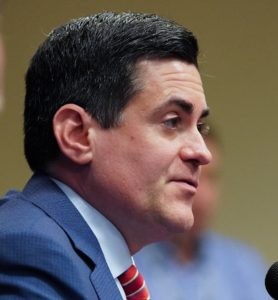Growing up in the Atlanta suburbs during the 1990s, I roamed about with much greater freedom than 9- and 10-year-olds enjoy today. But each time my mother released my sister and me to gallivant unsupervised around the mall or Six Flags, she would warn us.
“Beware of duffle bags,” her speech always began. From there, a familiar tale unfolded — little girls grabbed in bathrooms, drugged and stuffed into duffle bags before being sold into slavery overseas. She trained us to view every person carrying an oversized duffle bag with suspicion, lest we wake up kid-knapsack-ed inside the cargo hold of a plane on our way to becoming child brides.
I know everybody hauls baggage from their parents, but mine is literal luggage.
In my mother’s defense, Atlanta was and is a major hotspot for human trafficking. Like many parents in that era, she tried to balance safety with autonomy — both ours and hers. And while my mother’s efforts to instill vigilance were a touch more, um, theatrical than those of other parents, her reasoning resonated with the common thinking of that time: Strangers pose the greatest threat to the safety of children.
But that wasn’t true then, and it isn’t true now. Studies show the vast majority of sexual violence survivors suffer abuse and assault at the hands of familiar and trusted people.
The older brother of a neighborhood playmate, the leery-eyed band director, the charming youth pastor, the overly affectionate parent chaperone — these make for far less-interesting villains than the antagonists of Taken. But they’re closer to the truth, queasy as that may make us.
And yet, nearly 30 years later, my mother’s grim speeches about predatory strangers lurking in women’s public restrooms don’t sound at all out of place. Similarly fantastic fables began re-emerging in 2014, as legislators introduced anti-discrimination policies that would allow transgender persons to use facilities that correspond to their gender identity. Far-right conservatives, most of whom identify as Christian, immediately opposed the legislation, claiming women’s and children’s safety would be threatened by permitting “biological males” in their vulnerable spaces.
And it worked. To an electorate reared on tales of stranger danger and largely uninformed on what being transgender means, voting against anti-discrimination bills made all-too-much sense. Because who doesn’t want to protect women and children?
Conservative Christians, it turns out.
Professions over protections
In 2019, the Houston Chronicle and San Antonio Express-News published an impressive account of a disturbing number of sexual abuse cases perpetrated in churches affiliated with the Southern Baptist Convention. At last count, the tolls registered 700 victims of “roughly 380 church pastors, employees and volunteers.” Those devastating numbers likely reflect only a fraction of the total, given how rarely victims come forward. Numbers like these are horrifying, but zoom in, and the details are almost too much to bear.
A father repeatedly molested his daughter while on the mission field. When the SBC International Mission Board found out, they kept him on the field and never told his wife, thus exposing her daughter to more years of abuse.
A married pastor began molesting a 14-year-old, but when he impregnated her at 18, the church leadership “forced her to stand in front of the congregation and ask for forgiveness without saying who had fathered the child.” Then they “shunned her, asked her to get an abortion and, when she said no, threatened her and her child.”
A youth minister molested two teenage boys yet was allowed to quietly resign. He found work at another SBC church.
Again and again, church leaders did not hold abusers accountable. More often than not, they went on to victimize others. It’s a dire situation in need of oversight.
And yet during the past two years, the SBC has rejected adopting reasonable preventive measures proposed by survivors, dragged its feet to correct its slanderous account of survivor Jennifer Lyell’s story, and nearly derailed efforts to launch an independent investigation into the scandals. Meanwhile, some SBC leaders have been accused of perpetrating the very crimes they refuse to root out.
In lieu of enacting meaningful protections, the SBC has opted for loud, empty professions of concern.
In lieu of enacting meaningful protections, the SBC has opted for loud, empty professions of concern. To be fair, such hypocrisy isn’t unique to the denomination. Abuse of women and children never is notable until it is politically convenient. Hence the pattern of ignoring it where it actually exists and inventing it where it does not.
Case in point: The SBC’s attack on the Equality Act.
Holy hypocrisy
Passed by the U.S. House earlier this year, the Equality Act would add sex, sexual orientation and gender identity to the list of characteristics federally protected against discrimination in the Civil Rights Act of 1964. As it stands now, LGBTQ persons can be — and are — denied access to housing, credit, jury service, employment and federally funded programs in the majority of American states. The act would go a long way in rectifying that injustice. And the overwhelming majority of Americans support it.
But this landmark legislation currently is languishing in the Senate, thanks in no small part to the SBC’s efforts. Testifying before Congress, Russell Moore, then president of the SBC’s Ethics and Religious Liberty Commission, said the Equality Act “disregards the privacy and safety concerns” of women.
Here’s how the ERLC describes it:
The Equality Act disregards the privacy and safety concerns that women rightly have about sharing sleeping quarters and intimate facilities with the opposite sex. Single gender spaces, such as locker rooms or shelters, would no longer be protected by law. This departure from a legal understanding of gender as male and female makes women and girls vulnerable to biological males being in their private spaces. For example, shelters for those women and girls escaping domestic abuse or homelessness would be forced to house biological men who identify as female.
There it is — the old predatory-strangers-lurking-in-bathrooms trope. Never mind the fact no evidence supports the claim that allowing transgender persons, specifically transwomen, to use facilities that align with their gender identity increases women’s and children’s exposure to violence. None whatsoever.
As opposed to, say, 700 victims of 380 perpetrators?
And yet, where is the SBC choosing to focus its efforts at regulation? This disparity reveals much more than simple hypocrisy. It’s a tactic as old as time.
The Sodom Strategy
Many interpreters have weaponized Genesis 19 against the LGBTQ community, insisting God destroyed Sodom and Gomorrah because of the male citizens’ presumed raging homosexual lust. That this anachronistic theory has been debunked is of no apparent importance to these interpreters. Neither, it seems, are the women of this text.
Lot’s daughters possess no power and no protection other than their father. Yet he betrays their trust by offering them up to a bloodthirsty mob to be gang-raped in place of male guests, an almost unimaginable trauma that most conservative interpreters dismiss as insignificant. Why? Because the Sodomites don’t take Lot up on this exchange, thus simultaneously eliminating the threat against the women and proving their homosexual orientations. No need for concern here.
But the Sodomites’ refusal of Lot’s daughters says nothing about their sexual orientations and everything about the nature of rape — it is not a sex act, but an act of violence. It’s not about desire. It’s about domination.
After all, the abuse of women and children never is notable until it is politically convenient.
However, conservative interpreters consistently get this backward. They project modern notions of sexuality onto the Sodomites but overlook their violence. Then they project the Sodomites’ violence onto the modern LGBTQ community but deny the validity of their orientations and identities. It’s a useful, and possibly willful, misinterpretation. By preoccupying themselves with conflating violence and queerness, conservative interpreters don’t have to confront the real threat to Lot’s daughters — their own father.
Holding Lot accountable does nothing to demonize present-day queer people, so why would they?
After all, the abuse of women and children never is notable until it is politically convenient.
Know better, do better
Credible threats to women’s safety already have access to our vulnerable spaces. They are our fathers, pastors, Sunday school teachers, choir directors, volunteer youth directors. Three hundred eighty of them didn’t need federally issued invitations to abuse 700 victims. The SBC made sure of that.
That the SBC continues to ignore credible threats in favor of inventing nonexistent ones leaves us with a bitter conclusion: Women’s bodies only matter to the degree that they can disenfranchise whoever far-right “Christian” conservatives deem their political opponents.
They know better.
And by now, so should we.
Amy Hayes currently serves a Clemons Fellow with BNG. She is a master of divinity student at Mercer University’s McAfee School of Theology.
Related articles:
From purity pledges to the Equality Act: How evangelical concern about sex has shifted and what it has to do with creation | Analysis by Rick Pidcock
American support for Equality Act ideals still growing, new polling shows / News by Mark Wingfield
SBC Sexual Abuse Task Force has lost one-third of its time to delays, but now the work may begin / News by Mark Wingfield




